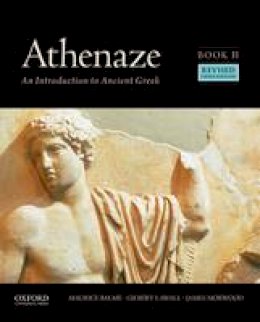
Stock image for illustration purposes only - book cover, edition or condition may vary.
Athenaze, Book II: An Introduction to Ancient Greek
Maurice Balme
€ 110.18
FREE Delivery in Ireland
Description for Athenaze, Book II: An Introduction to Ancient Greek
Paperback. .
Since its publication in 1990, Athenaze: An Introduction to Ancient Greek has helped tens of thousands of students learn classical Greek. Building on the bestselling tradition of previous editions, the long-awaited third edition combines the best features of traditional and modern teaching methods. It provides a unique course of instruction that allows students to read connected Greek narrative right from the beginning and guides them to the point where they can begin reading complete classical texts. James Morwood, editor of the Oxford Grammar of Classical Greek and the Pocket Oxford Classical Greek Dictionary, brings his expertise and years of teaching experience to this revision. Carefully designed to hold students' interest, the course begins in Book I with a fictional narrative about an Attic farmer's family placed in a precise historical context (432-431 B.C.). This narrative, interwoven with tales from mythology and the Persian Wars, gradually gives way in Book II to adapted passages from Thucydides, Plato, and Herodotus and ultimately to excerpts of the original Greek of Bacchylides, Thucydides, and Aristophanes' Acharnians. Essays on relevant aspects of ancient Greek culture and history are also woven throughout.
Product Details
Publisher
Oxford University Press Inc
Format
Paperback
Publication date
2016
Condition
New
Number of Pages
480
Place of Publication
New York, United States
ISBN
9780190607678
SKU
V9780190607678
Shipping Time
Usually ships in 4 to 8 working days
Ref
99-2
About Maurice Balme
Maurice Balme was former Head of Classics at Harrow School, UK. Gilbert Lawall is Emeritus Professor of Classics, University of Massachusetts, Amherst. James Morwood was Emeritus Fellow at Wadham College, Oxford.
Reviews for Athenaze, Book II: An Introduction to Ancient Greek
The storyline and characters of the text readily draw students into the language and culture of the Greeks. Athenaze is arguably the best first-year Greek text on the market.
Richard L. Phillips, Virginia Tech University
Athenaze is the best text for learning ancient Greek. Period.
George Rudebusch, Northern Arizona University
The approach is student friendly, the readings are varied and interesting, and the grammatical explanations are clear.
Laurie Cosgriff, Portland State University
Athenaze is an excellent adaptation of the reading approach for ancient Greek, with excellent Greek readings.
Nicholas Rynearson, University of Georgia
I have found Athenaze's methodology successful with today's broad range of student learning styles and varied levels of language sophistication.
Elizabeth A. Fisher, George Washington University
Athenaze, Books I and II, presents a thoughtful, reading-based approach to learning ancient Greek. Both books are interspersed with superbly written cultural and historical essays that introduce readers to the signature characteristics of Greek culture.
Stephen Esposito, Boston University
Richard L. Phillips, Virginia Tech University
Athenaze is the best text for learning ancient Greek. Period.
George Rudebusch, Northern Arizona University
The approach is student friendly, the readings are varied and interesting, and the grammatical explanations are clear.
Laurie Cosgriff, Portland State University
Athenaze is an excellent adaptation of the reading approach for ancient Greek, with excellent Greek readings.
Nicholas Rynearson, University of Georgia
I have found Athenaze's methodology successful with today's broad range of student learning styles and varied levels of language sophistication.
Elizabeth A. Fisher, George Washington University
Athenaze, Books I and II, presents a thoughtful, reading-based approach to learning ancient Greek. Both books are interspersed with superbly written cultural and historical essays that introduce readers to the signature characteristics of Greek culture.
Stephen Esposito, Boston University
